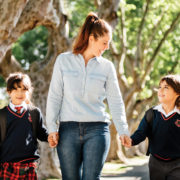
Part 01
How a private school’s curriculum helps students excel
Hint: it’s about so much more than just the ABCs
The curriculum is often one of the most important factors for parents when selecting a private school for their children. And, while many private schools follow the curriculum requirements set out by Ontario’s Ministry of Education, their autonomy affords them much greater freedom when it comes to what is taught and how.
Expert educators
Private-school teachers in Ontario do not require certification by the Ontario College of Teachers, but many are certified. Others are professionals in their field, who draw on their subject-matter knowledge, experience and expertise to educate students. “Each teacher of each subject is provided with ample resources to create solid foundations in curriculum requirements while providing opportunities to deliver lessons that adapt to the interests of students and the instructor,” says Michael Booth, principal at Toronto’s Lawrence Park campus of Blyth Academy, a nationwide network of private high schools. “[Their] experience in small schools and small classroom environments is at the forefront of all that we do.”
Many private-school teachers also make their continued education a top priority. “Our faculty are relentless lifelong learners,” says Kate Taylor, director of curriculum of The Sterling Hall School in North York, which focuses on social-emotional learning (SEL). “[They] continue to acquire knowledge by going back to school and participating in professional development.”
Specialized classes
From gifted classes to STEM, languages, sports, the arts and beyond, the curriculum at a private school is typically robust and diverse, catering to the unique interests, abilities and needs of its students. “Our teachers regularly hold education-strategy meetings to discuss how best to deliver the curriculum,” says Andy Hall, vice principal of high school at North York’s WillowWood School. “This is especially important for students with specific challenges to learning, whether they be socio-emotional or mild learning disabilities.”
At many private schools, parents’ and students’ input can also generate brand-new classes. “It takes as little as three or four students to express an interest in an elective course for it to be offered,” Hall says.
Customized approach
What a student learns is as important as how they learn, and private-school teachers can customize their lessons, instruction methods and evaluation criteria to suit their students’ myriad learning modalities. “Our unique approach is based on getting to know each individual learner,” says Jill Block, principal of WillowWood’s lower school. “[We cultivate] their strengths, areas of need, learning style, personal interests, and rate and pace of retention.”
At Rosseau Lake College, nestled in Muskoka, the school’s surroundings allow for an array of hands-on learning opportunities and outdoor instruction not possible in the city. “Classes make the most of our setting,” says the director of marketing and communications, Glen Herbert. “The campus is a learning lab—something that’s as true for biology and geography classes as it is for English.”
Ultimately, developing and executing a curriculum that produces well-rounded students is the goal of all private schools. “The idea of continued growth, of discovering and embracing passions, is what we strive for,” Herbert says.
More from Toronto Life's Private and Independent School Guide
-

Part 01
How a private school’s curriculum helps students excel
Hint: it’s about so much more than just the ABCs
-

Part 02
Private-school admissions 101
Understanding the key steps in the application process
-

Part 03
Four ways private schools foster a thriving campus culture
Cultivating a sense of community through a multi-pronged approach




